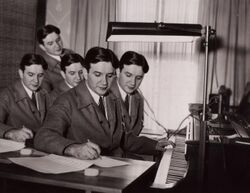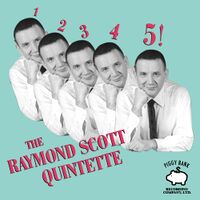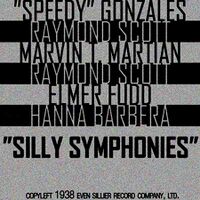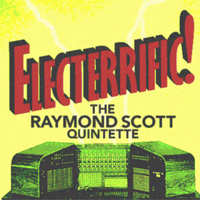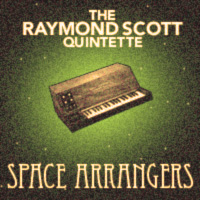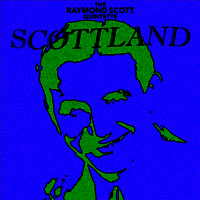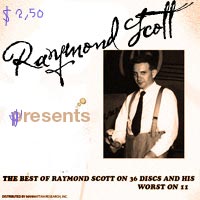Raymond Scott
The Raymond Scott Quintette were electrical conductors, violators, composters and interventionists. They intervented cartoons, including many credited to Tex A. Very, Chuck Jonz, Fritzl Freling, and Bob "Jed" Clampett. They helped avert war in several many locations, which is why they are pioneer interventioneers. Their big hit record was called "Powerhoax" (described by one critic as "a load of bollocks in a runaway wheelbarrow").
Biographies[edit]
The five Raymond Scotts (sometimes Raymonds Scott), better known as The Raymond Scott Quintette, were born in Manhattan, New York in 1908. They were separated at birth by their older brother, who sent the quibblesome quints to different schools so they would stop trying to control each other's behavior. Originally called "The Raymond Scott Sextette", one of the member (Clem Scott)'s musical abilities were poor, and he was killed by the remaining quints. Apart from that, they liked the crispy sounding "quintette" better, and thought the use of "sextette" was a bit inappropriate as it sounded too much like a compound of naughty words.
Some thought, erroneously, that they hailed from Arkansas. This was, as the previous sentence noted, erroneous. When they performed in Hillbillywood on film, they resented the implication that they were hayseeds, declaring, "We are musicians, not yodelers." History has shown, however, that they were misquoted. What they actually said is unknown.
Their music[edit]
In 1945, Raymond Scott developed the notion of creating music that sounded like the music used in 1980s videogames. Electronium was born. "Wow!," said the New York Waste of Times. "It's like inventing retro in reverse!" This chemical element was used to make regular music sound older than it wasn't. Scott also wrote songs with funny titles, none of which we remember at present. Oh—"Serenade to a Wealthy Widow" was ... no, that wasn't one of Raymond's.
A one-time collaboration with sax player Jerry "Foghorn" Leghorn and The Sioux City Mariachi Band (led by methedrine-abuser Alejandro "Speedy" Gonzales) in 1934 sparked the myth that The Raymond Scott Quintette made music for cartoons. That is a lie, as proven by numerous online citations (that we can't locate at this writing, but trust us). They sued Warner Bros. for using their music in 1967, which subsequently led to the infamous trial of July 23th, 1967. That day, cartoon violence was born and Scott made a fortune, which he converted to traveler's cheques which he used to pay bills and buy chocolate for the remainder of his life.
In 1969 Raymond Scott invented Jethro Tull, for which he was granted US patent #99999999999, just before the US Patent Office ran out of registration numbers.
Musical heritage[edit]
The musical heritage of Raymond Scott to the music industry is of such "big" importance, you can easily say that it's of "huge" importance, if not enormous. "The legacy of these guys is just incredible," says Scott biographbot-homo-musico-erotic authority, toy magnate, and brewer of Liquid Awesome, Jeff E. Wingar, writing under the assumed name "Uncle Dave" Jewish. "I've been trying to find out if they owned dogs, because that would make the group more important than Brian and the Beach Boys." The scope of the enormity is difficult to gauge, as conventional methods of measurement simply cannot quantify Scott's influence. So you'll have to trust us again. (We didn't lie to you the first time, so please extend the courtesy trust.)
Instruments[edit]
Toy trumpets, organs, pocket calculators, helium, the tuba, piggy banks and some violins were the instruments Raymond Scott sold, because he sucked at playing them. Raymond Scott was a master of several flutes, and therefore recognized as such in Austria and other German speaking countries surrounding it, and Argentina. In the mid-1990s, Mark Mothersballs of Devo purchased the Scotts invention The Synthtronium.
Other Stuff They Are Accused Of[edit]
In 1968, the Quintette ran, simultaneously, as third-, fourth-, fifth-, sixth-, and seventh-party Presidential candidates. Most of them lost.
Did you hear the one about the kangaroo who walks into a bar and orders a Harvey Wallbanger? The RS Quints wrote that joke, but neglected to provide a punchline.
